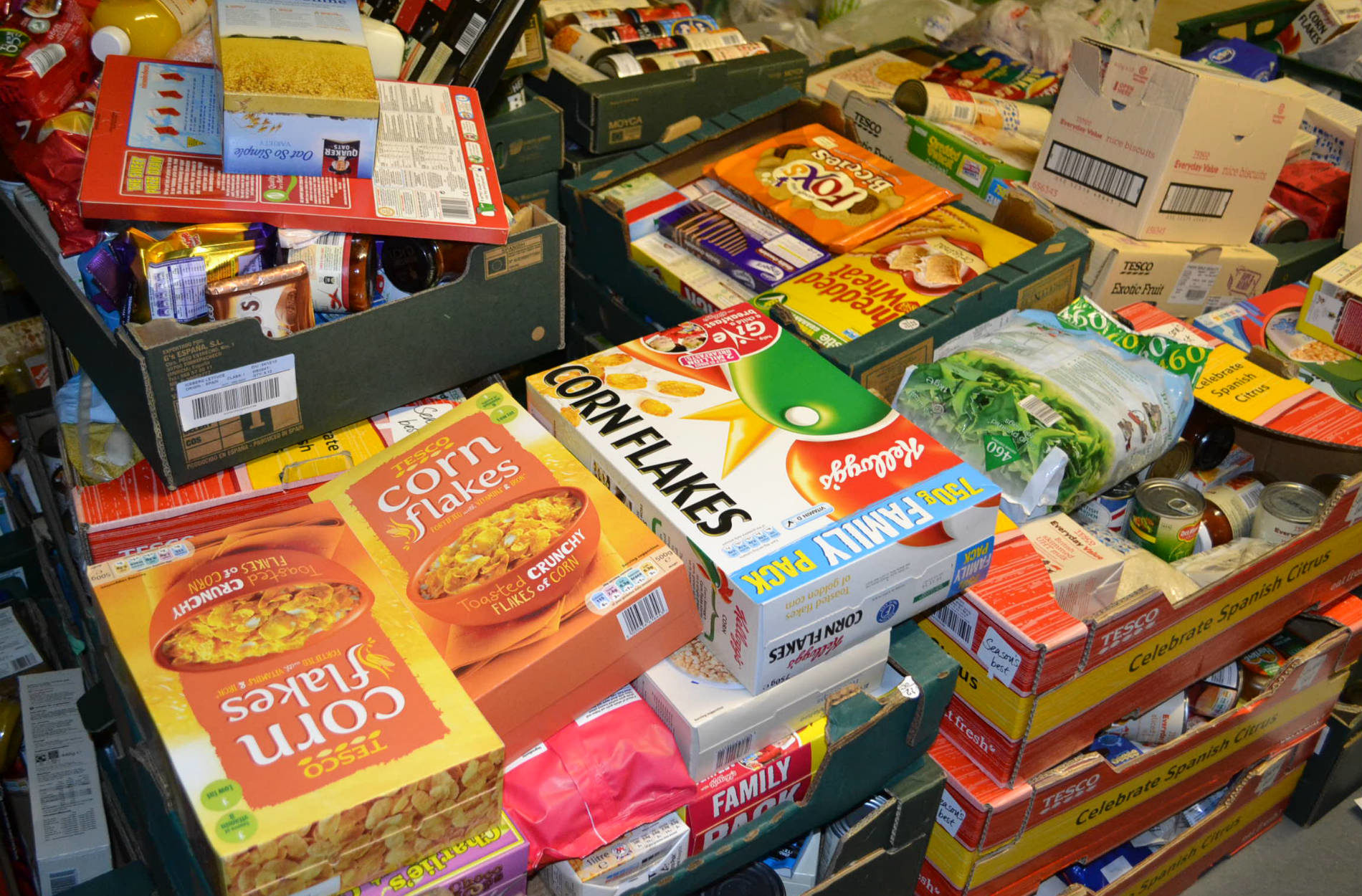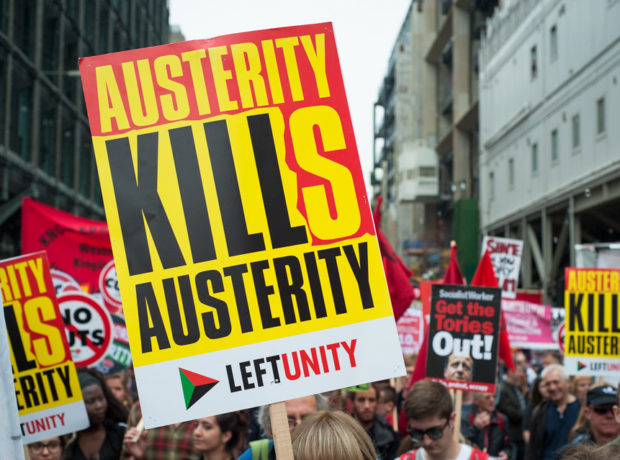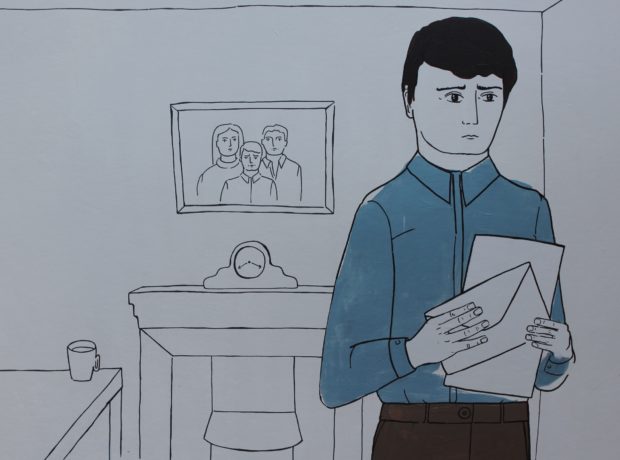Last October, Lacuna published ‘The Foodbank Dilemma’, James Harrison’s investigation into the explosion of foodbanks around Britain over the last 5 years. It was re-published in the New Statesman and Open Democracy. Here James reflects on how the Foodbank phenomenon was (mis-)used as a key symbolic election issue. He argues that it is absolutely vital we take the role of emergency food aid more seriously in post-election Britain.
Jeremy Paxman sits back comfortably in his chair. Hands folded in front of him. Clipboard of questions resting on his knee. It is 9pm on 26 March 2015. It is the night of the ‘Leaders Debates’, which kicks off the British General Election Campaign. No Newsnight for Jeremy for nine months. No politicians to devour in all that time. How will Paxman react to finally being let off the leash? What will his opening gambit be?
“David Cameron, do you know how many food banks there were in this country when you came to power?”
“I don’t have the exact figures but I know that usage of food banks has gone up and there are many amazing volunteers who man those food banks and provide an important service”
“There were 66 when you came to power, there are now 421. Nine. Hundred. Thousand. People took food parcels last year. Free food parcels. You talked about broken Britain and fixing it. You haven’t. It’s more broken now than it was before.”
“Well I don’t accept that because if you look at what has happened with our economy, there are 1.89 million more people in work than when I became Prime Minister…”
“Is an increase in foodbanks a mark of success?”
Paxman Interrupts “Is an increase in foodbanks a mark of success?”
“Obviously there has been an increase in foodbank use. That’s partly because of the difficulties we faced as a country. It’s also because we changed the rules. The previous government didn’t allow job centres to advertise the existence of foodbanks. They thought it would be bad PR. I thought that was a poor decision. So we allowed them to point people towards foodbanks if they needed them.” [The camera cuts to Paxman and he gives us that trademark sceptical sneer, Cameron changes tack]. “But look, the big picture here is that we want to get more people back to work, and turn the economy around, and it is jobs that are the best route out of poverty.”
“Is it really acceptable in a rich country like ours that there are that many people depending on free food aid?”
That’s how the 2015 British General Election campaign began. Paxman started his ‘skewering’ of David Cameron with the Foodbank phenomenon. But it didn’t stop there as an election issue.
On 22 April, the Trussell Trust (the UK’s largest Foodbank network) released figures that showed food bank use had topped the 1 million mark over the past year. It was picked up in newspaper headlines across Britain.
Then there was a reappraisal. “Food bank charity ‘is misleading the public’: Claim that 1 million need food parcels ‘just self promotion’” ran a Daily Mail headline on 23 April 2015. Critical headlines also appeared in the Telegraph and Spectator. Chris Mould, the chairman of the Trussell Trust was forced into a clarification:
“A way of putting it is that half a million unique people have been helped in the last 12 months by Trussell Trust foodbanks, typically some of them have been helped more than once during the year and the foodbanks have had to provide food for a million users.”
This apparent climb-down was seized upon by government officials. A ‘senior Whitehall source’ accused Mr Mould of ‘misleading and emotionally manipulative publicity seeking’, adding ‘It’s not entirely surprising given Chris Mould is effectively running a business.’ He went on to accuse the Trussell Trust of “aggressive marketing of services”.
The furore around the issue carried on through the election campaign, and into the final election TV debate – a ‘Question Time Election Leaders Special’. This time it was the audience who took up the Paxman role, and ‘came at [the Leaders] like hounds who’d been kept caged and without food for a week’. When it came to Cameron, foodbanks were again a key weapon in the armoury.
8 minutes into his allotted time, Cameron lists the economic achievements of his first term in office “The deficit is halved, 2 million people are back in work, the economy is growing faster than any major economy in the western world.”
Dimbleby goes to the audience. A well-dressed woman in the middle of the third row puts up her hand. Politely but firmly she asks “If things are all so fantastic and we all have more money to spend, why are more families relying on foodbanks than ever before?” Lengthy applause.
Why are more families relying on foodbanks than ever before?
Cameron doesn’t answer the question. Instead he talks of an unfinished job, getting the country back to work, paying back our debts, “so we can hand on a really good country to our children.” Silence.
Dimbleby goes to another woman higher up on the left hand side of the studio. She is more emotional and strident “You talk about the sort of country you want to hand on to our children. I don’t want to hand on a country to my child where a million people are using foodbanks.” Lengthy applause again.
Cameron responds “First of all, let me say, I don’t want anyone to have to rely on a food bank in our country. It is important they are there, but I don’t want anyone to rely on them…”
The questioner interrupts
“They do. They do. You are Prime Minister and they do.”
“The most important thing we can do is get more people into work. That’s the best route out of poverty…”
Nick Clegg was also accosted on foodbanks in the final TV debate. It was a minor skirmish for him, compared with the five minute impaling he took on tuition fees. But it was instructive nevertheless. Audience member David Jackson, asked “Nick, how do you feel about the huge increase in people driven to use foodbanks, many of them in work poverty or falling foul of benefit sanctions?”
Clegg talked about general economic issues and his push for fairness within government, but he did eventually attempt to address the question:
“I have become persuaded, listening to the Trussell Trust and others who have provided evidence about the reasons why people are using foodbanks that, in effect, we need a ‘yellow card’ system. That some of the sanctions that are applied to people who don’t meet the conditions of their benefits, shouldn’t be imposed quite as harshly or as automatically as they are. And that is a change that I would want to introduce in the next Parliament.”
The election debate about the number of people using foodbanks and the debate about why people are using them was deeply flawed. The only person who appears to have listened to the evidence is Nick Clegg.
The Trussell Trust certainly could have presented their figures differently. When you say “more than 1 million people received three days’ food from Trussell Trust foodbanks”, readers will take that to mean 1 million separate individuals (as the audience did in the last election TV debate). The best estimate is, rather, that just over 500,000 unique users visited Trussell Trust Foodbanks last year. Just over 1 million parcels were distributed. On average, people visited twice (you can receive a maximum of 3 parcels in a six month period). That’s what gives you the total of 500,000 unique users.
The Telegraph and Daily Mail were therefore perhaps justified in seizing upon the misleading way in which the Trussell Trust portrayed their own figures. But they did nothing to inform the general public about how many people in crisis are receiving free emergency food. That’s because the Trussell Trust are by no means the only emergency food aid providers in Britain today. They are simply the most organised and co-ordinated. The truth is we have no idea of the full extent of who is providing food and who is receiving it. Governments do not think it is a statistic worth collecting.
Oxfam and Church Action on Poverty have tried to collect figures. They calculated that more than 20 million meals were given to people in food poverty in 2013-14 by the three main food aid providers. But that does not take into account any of the foodbanks, soup kitchens, breakfast clubs and other forms of emergency food aid that are run on a local basis. For instance, in 2013, only three out of 26 food parcel providers in the city of Glasgow belonged to the Trussell Trust network.
The “420 foodbanks” figure is increasingly misleading
Paxman was right about the explosion of foodbanks around Britain during David Cameron’s government. But when he talked about 421 foodbanks in Britain today (its 445 according to the most recent figures), he was again only talking about Trussell Trust foodbanks. Even that figure understates the size of the Trussell Trust’s network. When I interviewed Adrian Curtis, the Trussell Trust’s Foodbank Network Director last year, he told me that the “420 foodbanks” figure is increasingly misleading:
“We tend to talk more now about ‘foodbank centres’ when measuring the size of the network. There are around 420 foodbanks in Britain. But many of those foodbanks are now operating at a number of different centres where people can come and receive food. We estimate that there are around 1,400 foodbank centres now.”
Just as flawed as the debate about numbers, was the debate about rationales. David Cameron attempted to blame better advertising by Job Centres as the reason for the Trussell Trust’s growth. This was the latest in a long line of attempts by government officials to shift the blame for the foodbank phenomenon from their own policies. But job centre referrals account for only 3% of people using foodbanks. Almost 35,000 frontline professionals gave out Trussell Trust foodbank vouchers last year. They included doctors, social workers, health visitors and debt councillors. What they share are common rationales for the referrals they made.
Top of the list of reasons is the government’s own welfare reform agenda (as alluded to by Nick Clegg). 43% of Trussell Trust foodbank users were referred last year because of welfare benefit changes, delays and sanctions. The link between government policy and foodbank use is also supported by academic research which has found that “the rise in food bank use is … concentrated in communities where more people are experiencing benefit sanctions. …[L]ocal authorities with greater rates of sanctions and austerity are experiencing greater rates of people seeking emergency food assistance.”
So it’s not Job Centre staff, rather it’s Department of Work and Pensions policies that are the biggest reason for the increase in numbers.
Second on the list is low income (22% of referrals). Trussell Trust foodbank managers are reporting that people “who are in work are struggling with insecure work, low wages and high living costs.” So for David Cameron to respond to questions about foodbanks by simply quoting job statistics is to ignore the problems of in-work poverty.
Most reprehensible of all was the suggestion by a government official in the election campaign that aggressive marketing is a key reason for the growth of the foodbank network. Report, after report, after report has revealed the same situation that I found when I visited foodbanks around the country. Foodbanks are ‘a place of last resort’, driven by demand from desperate people, not consumers convinced by a clever marketing campaign.
Foodbanks were a symbolic election issue. Families relying on foodbanks became the classic counter-argument to claims of an economic recovery benefitting all of Britain. But the election campaign was dominated by the search for soundbites and the hunt for headlines. It did not kick-start a serious debate about emergency food aid, and its place in modern Britain. That debate needs to start now. And action needs to follow.
David Cameron said during the election campaign that it was important that foodbanks were there, but that he did not want anyone in Britain to have to rely on one. The Trussell Trust’s stated aim is that every town in Britain should have a foodbank. At the same time, the Trust is “working towards less people coming to our food banks all the time.” Is a universal service that no one actually needs, a feasible or even desirable proposition? In post-election Britain, we should scrutinise this carefully, particularly when the political and economic climate makes reducing the numbers look like a very tough ask.
First, it is a tough ask because of welfare reform. Nick Clegg’s ‘yellow card’ system for benefits sanctions will not be implemented. Instead, a majority conservative government will impose £12 billion of additional benefit cuts. Everyone, including those elements of the press that are most supportive of the government, recognise that this will be phenomenally difficult to achieve. In order to make it happen, civil servants start coming up with ideas like limiting welfare payments by family size, stricter fit-for-work tests for disability payments, barring under-25s from incapacity or housing benefit, abolishing carer’s allowance, taxing disability benefits and limiting child benefit to the first two children. Given what we already know about those driven to use foodbanks, these kind of cuts and changes must create a serious danger of significantly increased users.
Job creation alone will not stop people using foodbanks. ‘In-work’ poverty must be tackled as well.
Second, there is the issue of underlying poverty. Almost 30% of people who use Trussell Trust Foodbanks give the primary reason for their visit as low income or debt. And over the last year, the numbers going to Trussell Trust foodbanks because of low income increased significantly. Numerous surveys and studies have forecast increased levels of ‘in-work’ poverty and debt in the UK over the next five years. Job creation alone will not stop people using foodbanks. ‘In-work’ poverty must be tackled as well.
If government officials are to have any credibility on this issue, they need to recognise this context, and take action to ensure foodbank numbers are going down and not up, drawing upon the academic research which provides clear recommendations on how to better monitor and tackle food poverty. In the absence of government action, there is a moral imperative on those who run Britain’s foodbank networks to ensure that more people do not become more and more reliant on emergency food aid.
The Leaders of Glasgow and Edinburgh City Councils recently put out a joint statement in which they expressed their concern about further growth in foodbanks. They argue that “[e]xperience elsewhere has shown that when food banks become too well established they undermine the fundamental rights enshrined in our welfare system. If we become too reliant upon them we risk a return to charity welfare – this must not happen.”
‘Elsewhere’ refers, above all, to the US, whose emergency food aid programme took off more than 30 years ago. As I argued in the Foodbank Dilemma, “the underlying social and economic dynamics of 21st century Britain eerily echo what occurred in the US of the 1980s”. Feeding America, the US’s largest distributor of emergency food aid, now claims to provide food assistance to an estimated 46.5 million people annually.
How do we ensure that doesn’t happen here? There are lots of ideas out there. First there is the way in which foodbanks themselves are constructed. The Trussell Trust has always argued that their foodbanks do not create the same risks of long term reliance on food charity as in the US. This is because they offer “a time-limited crisis intervention” and direct people to support that can help them with their longer-term problems. Today, their foodbanks increasingly provide a range of services, from financial advice to healthy cooking courses, to help clients become more resilient. But such an approach needs to be monitored very carefully to make sure it is actually working. Will “super-foodbanks” reduce demand or further entrench charitable food aid as a permanent part of Britain’s social and economic landscape?
Second, there are alternative food initiatives like food cooperatives, community shops, food unions, and community gardens. What such initiatives have in common is that they create deeper levels of engagement, ownership and empowerment for people over the food they eat. But can such initiatives operate on a large enough scale to make serious inroads into food poverty in modern Britain?
Finally, there are solutions that seek to address the root cause of food poverty. Many of these solutions have been advanced for a long time, including by people at the heart of the foodbank movement – The introduction of a living wage, improving (and not reducing) support from government agencies for vulnerable people, and tackling the ‘poverty premium’. None of these changes will happen without sustained and concerted action. We therefore need to make sure that individual acts of food charity aren’t a substitute for collective voices demanding change within our society.



